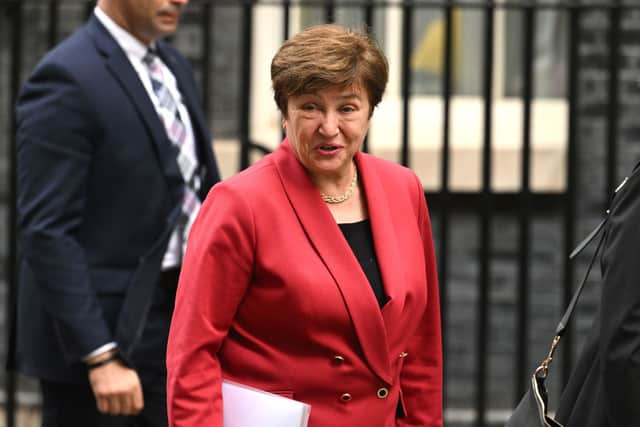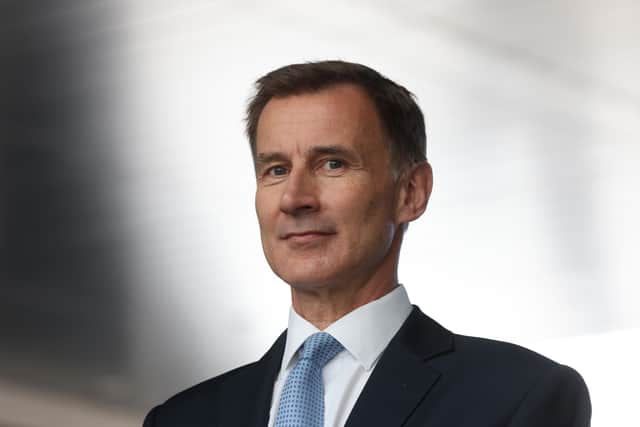What is the IMF UK forecast? Will UK have a recession - inflation and interest rates predictions explained
and live on Freeview channel 276
The International Monetary Fund (IMF) has upgraded its outlook for the UK economy, predicting GDP will now grow and the country will avoid a recession in 2023.
In news that will provide a major boost to Rishi Sunak, who made growing the economy one of his key missions earlier this year, the country is forecasted to see growth of 0.4% rather than the contraction of 0.3% the IMF previously predicted in April. However, the organisation warned “considerable” risks - like sticky inflation - could still derail its outlook.
It comes as the UK awaits the latest set of inflation data from the Office for National Statistics (ONS). Last time around, the rate of prices rises across the economy did not fall by as much as expected. It has left the UK as an outlier among the major western global economies.
Earlier in May, the Bank of England hiked interest rates to a new 14-year high of 4.5% in a bid to push the inflation rate down further. The move has left commentators predicting mortgage rates will remain inflated for at least another 18 months before coming down again.
So, what has the IMF said - and what does it mean for the UK?
What is the latest IMF UK forecast?
On Tuesday (23 May), the International Monetary Fund updated its assessment of the UK economy following a factfinding mission to the country.
In its latest report, it upgraded its forecast for UK GDP growth in 2023 from -0.3% to a “subdued” +0.4%. It also said it expects growth to rise to 1% in 2024 - in linewith its previous forecast - and to average 2% in 2025 and 2026. It added that its projections are based on growing consumer purchasing power as inflation falls, as well as an easing off in interest rates.


While the UK now looks set to avoid a recession - a downturn having previously been seen as an inevitability in the wake of Liz Truss’s Mini Budget - the IMF warned sticky inflation and uncertainty in the global economy could still dent the UK’s economic prospects. One of the risks It pointed to was banking sector turmoil, which could make it harder for people to be approved for a mortgage and for businesses to get loans.
To keep the economy on track, it said the Bank of England was “likely” to have to continue to hike interest rates and keep them elevated for longer to overcome embedded price rises in the economy. It also suggested the government should continue to maintain a tight leash on public spending - although it said it should also allocate money to invest in skills, innovation, infrastructure and the move towards a greener economy.
The IMF added that the government could make room for more public spending by introducing policy changes - for example, by scrapping the triple lock pension, bolstering fossil fuel taxes, and eliminating loopholes in wealth and income taxes. Rishi Sunak has been under the microscope for his family’s tax affairs after his tax returns showed he had paid a rate equivalent to the basic rate of income tax on millions of pounds in capital gains. His wife, Akshata Murty, has also previously benefitted from a tax loophole.
But IMF chief Kristalina Georgieva praised the Sunak government for its work on the economy and said the UK was now comparing “favourably” to other G7 nations, like Germany. “What we have [amid global economic uncertainty] is a very responsible action from the Bank of England, tightening of monetary policy and the spring and autumn budgets that are aligning fiscal policy with the objectives of monetary policy to fight inflation,” she said. Alluding to Chancellor Jeremy Hunt’s priorities and reforms, she said: “We see that as being a concept that practically would make a difference for the competitiveness and growth potential of the UK.”
Ms Georgieva also said her organisation did not see any wisdom in implementing tax cuts in the medium-term. “The focus on fighting inflation, and I repeat, that it is so important. Inflation is a tax and it is heaviest on the poor so getting inflation under control is the right objective at the time when we are seeing record high levels over decades,” she said. When inflation is less of a priority, she said that “then we look into how the UK can grow faster and in a more sustainable manner and that would put pressure on increasing spending in some key areas”.
Speaking at the same press conference as the IMF’s managing director, Jeremy Hunt said the latest outlook from the organisation was “a timely, independent assessment of the UK economy” and showed the UK was “on the right track”.


“Today’s IMF report shows a big upgrade to the UK’s growth forecast and credits our action to restore stability and tame inflation,” he said. “It praises our childcare reforms, the Windsor Framework and business investment incentives. If we stick to the plan, the IMF confirm our long-term growth prospects are stronger than in Germany, France and Italy – but the job is not done yet.”
What did the IMF previously say?
The IMF’s latest assessment of the UK economy is much more optimistic than its previous forecasts.
It was especially critical of Liz Truss’s economic plans, and warned in April that the UK’s economy was on course to contract by 0.3%. Over 2023 and 2024, it predicted the UK would fall behind the world’s other advanced economies, particularly Spain (+3.5%) and Canada (+3%), as it will only have grown by 0.7%. While the latest update means the UK is still well behind these other economies, its growth will now be double this previous GDP estimate.


In April, IMF director of research Pierre-Olivier Gourinchas said: “The UK economy seems to be doing a little bit worse than some other comparable economies [because] there is a higher dependence on imported energy with a high share of gas – and with the gas prices we’ve had last year, that’s a major negative trade shock – there’s a fairly tight labour market and so there has been a need for fairly aggressive tightening of monetary policy.”
But the IMF also issued more positive news about interest rates at its meeting in Washington DC in April. It said it expected borrowing costs to drop in the world’s major economies as a result of low productivity and ageing populations. Having more older people in a country tends to see demand fall, which makes it harder for inflation to rise. Here in the UK, the proportion of adults aged 60 and older has grown to more than 35% over the last decade and is only set to increase, according to the Bank of England.
"When inflation is brought back under control, advanced economies’ central banks are likely to ease monetary policy and bring real interest rates back towards pre-pandemic levels," the IMF said in a blog post. It added that it anticipates the current high rates will only be “temporary”.
Comment Guidelines
National World encourages reader discussion on our stories. User feedback, insights and back-and-forth exchanges add a rich layer of context to reporting. Please review our Community Guidelines before commenting.
